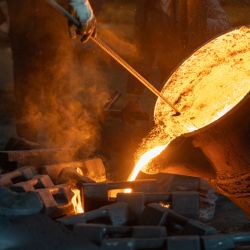Steel casting is a versatile manufacturing process that involves creating complex shapes and parts by pouring molten steel into molds. This method is essential across various industries due to its strength, durability, and cost-effectiveness. In this comprehensive guide, we will explore the world of steel casting, covering its processes, applications, and the advantages it offers.
Chapter 1: Understanding Steel Casting
1.1 The Casting Process: Steel casting involves melting steel, pouring it into a mold, and allowing it to solidify. This process allows for the creation of intricate shapes and sizes.
1.2 Types of Steel Used: Different types of steel, such as carbon steel, alloy steel, and stainless steel, are used depending on the application's requirements.
1.3 Mold Types: There are various mold types, including sand casting, investment casting, and die casting, each with its unique advantages.
Chapter 2: Steel Casting Processes
2.1 Sand Casting: Involves creating molds from sand and is one of the oldest and most versatile methods of steel casting.
2.2 Investment Casting: Known for its precision and ability to create intricate parts, it uses wax patterns that are lost during the process.
2.3 Die Casting: Ideal for high-volume production, it involves injecting molten steel into reusable molds.
2.4 Continuous Casting: Commonly used for producing long steel products like bars and pipes, it provides consistent quality.
Chapter 3: Applications of Steel Casting
3.1 Automotive Industry: Steel casting is used to create engine components, transmission parts, and chassis components due to its strength and durability.
3.2 Aerospace Industry: Steel casting is essential for aircraft components that require high strength-to-weight ratios.
3.3 Construction: Steel casting is used in the construction of bridges, buildings, and other infrastructure due to its load-bearing capabilities.
3.4 Energy Sector: The energy industry relies on steel casting for components in power plants, turbines, and pipelines.
Chapter 4: Advantages of Steel Casting
4.1 Design Flexibility: Steel casting allows for complex and intricate designs that would be challenging or impossible to achieve with other manufacturing methods.
4.2 Strength and Durability: Steel is known for its exceptional strength and durability, making it suitable for heavy-duty applications.
4.3 Cost-Effective: The ability to produce intricate parts with minimal waste and machining often results in cost savings.
4.4 High-Quality Finish: Steel casting provides a high-quality surface finish, reducing the need for additional finishing processes.
Chapter 5: Quality Control in Steel Casting
5.1 Material Inspection: Rigorous material testing ensures the quality and integrity of the steel used.
5.2 Process Control: Monitoring and controlling variables during casting to minimize defects.
5.3 Post-Casting Inspection: Thorough inspection and testing of finished parts to ensure they meet specifications.
Chapter 6: Environmental Considerations
6.1 Recycling: Steel is highly recyclable, making steel casting a sustainable choice.
6.2 Emissions: Modern steel casting facilities are designed to minimize emissions and environmental impact.
Conclusion
Steel casting is a vital manufacturing process that plays a crucial role in a wide range of industries, from automotive to aerospace and construction. Understanding the various casting processes, applications, and benefits of steel casting is essential for manufacturers and engineers looking to harness the strength, durability, and cost-effectiveness it offers. Whether you're designing complex components or seeking a reliable and versatile manufacturing method, steel casting is a valuable option worth considering.


No comments yet